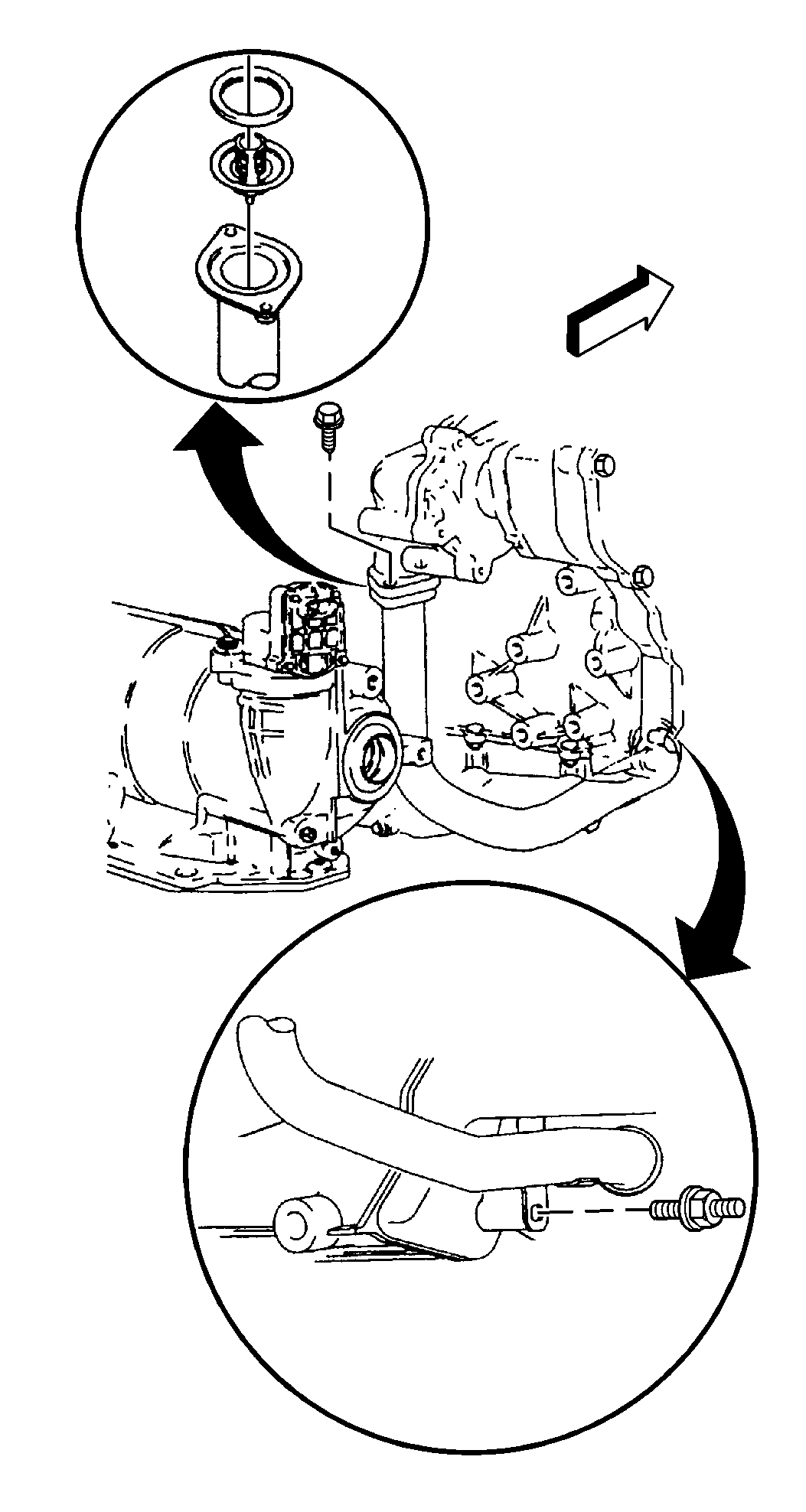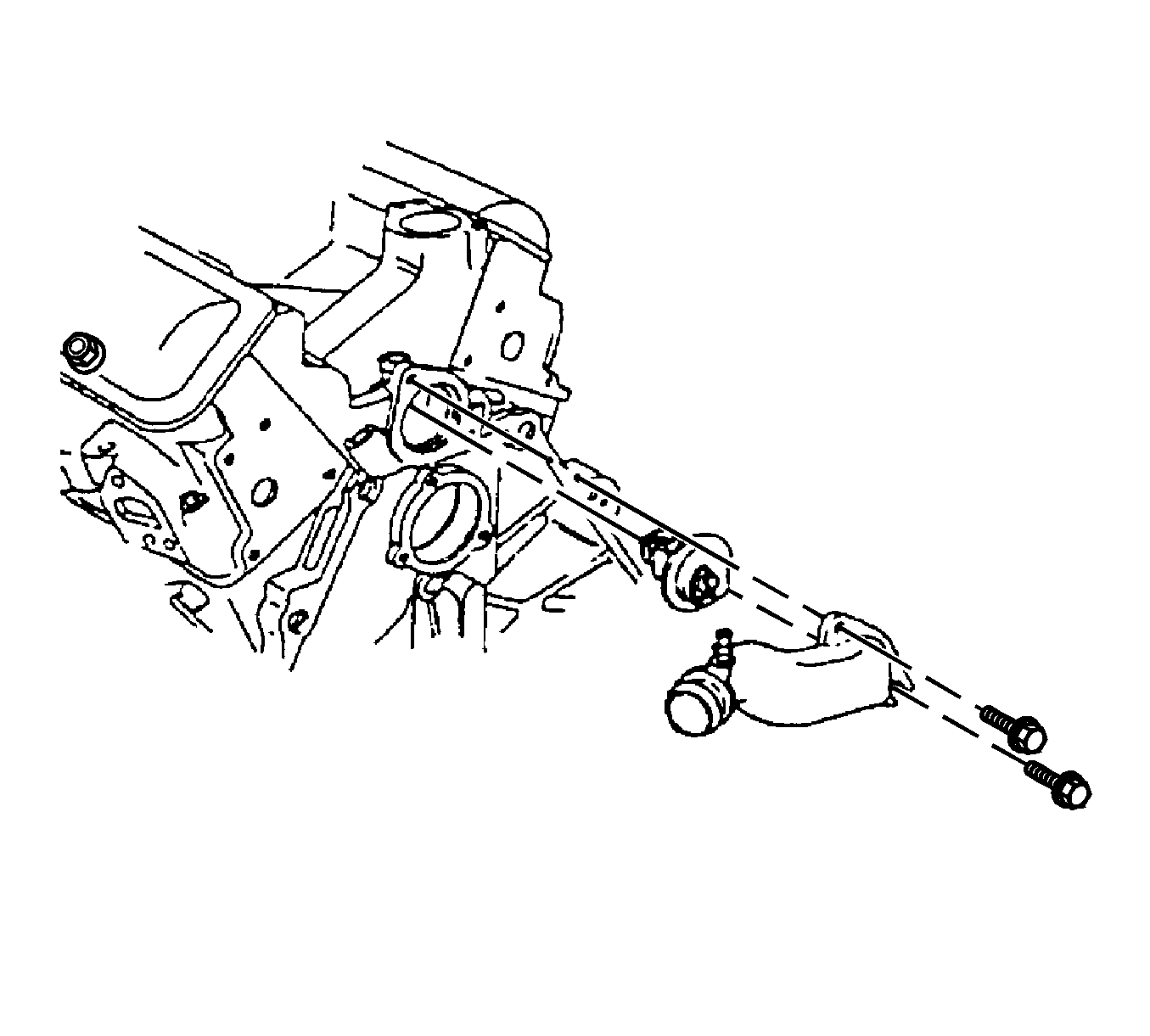Engine Coolant Thermostat Replacement 2.4L
Removal Procedure
Caution: Unless directed otherwise, the ignition and start switch must be in the OFF or LOCK position, and all electrical loads must be OFF before servicing any electrical component. Disconnect the negative battery cable to prevent an electrical spark should a tool or equipment come in contact with an exposed electrical terminal. Failure to follow these precautions may result in personal injury and/or damage to the vehicle or its components.
- Disconnect the negative battery cable.
- Drain and recover the coolant.
- Remove the exhaust manifold heat shield. Refer to Exhaust Manifold Replacement in Engine Mechanical 2.4L or Exhaust Manifold Replacement in Engine Mechanical 3.1L.
- Remove the coolant inlet housing bolts through the exhaust manifold.
- Raise the vehicle. Refer to Lifting and Jacking the Vehicle in General Information.
- Remove the coolant inlet housing stud from the oil pan.
- Remove the tire and wheel assembly. Refer to Tire and Wheel Removal and Installation in Tires and Wheels.
- Remove the splash shield. Refer to Wheelhouse Splash Shield Replacement in Body Front End.
- Remove the bolts from the transaxle-to-engine block brace. Remove the brace. Refer to Transmission Replacement in Automatic Transaxle 4T40 - E/4T45 - E.
- Remove the coolant housing pipe.
- Remove the thermostat.
- Clean the mating surfaces.
Notice: When adding coolant, it is important that you use GM Goodwrench DEX-COOL™ coolant. If coolant other than DEX-COOL™ is added to the system, the engine coolant will require change sooner: at 50 000 km (30,000 miles) or 24 months.
Refer to Cooling System Draining and Filling .

Installation Procedure
- Install the thermostat.
- Install the coolant housing pipe.
- Install the transaxle-to-engine block brace and secure with the bolts. Refer to Transmission Replacement in Automatic Transaxle 4T40 - E/4T45 - E.
- Install the splash shield. Refer to Wheelhouse Splash Shield Replacement in Body Front End.
- Install the tire and wheel assembly. Refer to Tire and Wheel Removal and Installation in Tires and Wheels.
- Install the gasket.
- Install the coolant inlet housing stud to the oil pan.
- Lower the vehicle.
- Install the coolant inlet housing bolts through the exhaust manifold.
- Install the exhaust manifold heat shield. Refer to Exhaust Manifold Replacement in Engine Mechanical 2.4L or Exhaust Manifold Replacement in Engine Mechanical 3.1L.
- Fill the cooling system.
- Connect the negative battery cable.
- Inspect the system for leaks. Refer to Cooling System Leak Testing .

Notice: Use the correct fastener in the correct location. Replacement fasteners must be the correct part number for that application. Fasteners requiring replacement or fasteners requiring the use of thread locking compound or sealant are identified in the service procedure. Do not use paints, lubricants, or corrosion inhibitors on fasteners or fastener joint surfaces unless specified. These coatings affect fastener torque and joint clamping force and may damage the fastener. Use the correct tightening sequence and specifications when installing fasteners in order to avoid damage to parts and systems.
Tighten
Tighten the bolt to 26 N·m (19 lb ft).
Tighten
Tighten the bolt to 14 N·m (124 lb in).
Refer to Cooling System Draining and Filling .
Tighten
Tighten the bolt to 16 N·m (12 lb ft).
Engine Coolant Thermostat Replacement 3.1L
Removal Procedure
- Disconnect the negative battery cable.
- Drain and recover the coolant.
- Remove the air cleaner assembly. Refer to Air Cleaner Assembly Replacement in Engine Controls - 2.4L or Air Cleaner Assembly Replacement in Engine Controls - 3.1L.
- Remove the surge tank line from the coolant outlet.
- Remove the coolant outlet to the inlet manifold attaching bolts.
- Remove the coolant outlet.
- Remove the thermostat.
- Clean the inlet manifold mating surfaces.
- Clean the coolant outlet mating surfaces.
Caution: Unless directed otherwise, the ignition and start switch must be in the OFF or LOCK position, and all electrical loads must be OFF before servicing any electrical component. Disconnect the negative battery cable to prevent an electrical spark should a tool or equipment come in contact with an exposed electrical terminal. Failure to follow these precautions may result in personal injury and/or damage to the vehicle or its components.
Refer to Cooling System Draining and Filling .

Installation Procedure
- Install the thermostat in the inlet manifold.
- Install the coolant outlet to the inlet manifold.
- Install the attaching bolts.
- Install the air cleaner assembly. Refer to Air Cleaner Assembly Replacement in Engine Controls - 2.4L or Air Cleaner Assembly Replacement in Engine Controls - 3.1L.
- Install the surge tank line to the coolant outlet.
- Fill the engine with coolant.
- Connect the negative battery cable.
- Inspect the system for leaks. Refer to Cooling System Leak Testing .

Notice: Use the correct fastener in the correct location. Replacement fasteners must be the correct part number for that application. Fasteners requiring replacement or fasteners requiring the use of thread locking compound or sealant are identified in the service procedure. Do not use paints, lubricants, or corrosion inhibitors on fasteners or fastener joint surfaces unless specified. These coatings affect fastener torque and joint clamping force and may damage the fastener. Use the correct tightening sequence and specifications when installing fasteners in order to avoid damage to parts and systems.
Tighten
Tighten the bolts to 25 N·m (18 lb ft).
Refer to Cooling System Draining and Filling .
Tighten
Tighten the bolt to 16 N·m (12 lb ft).
